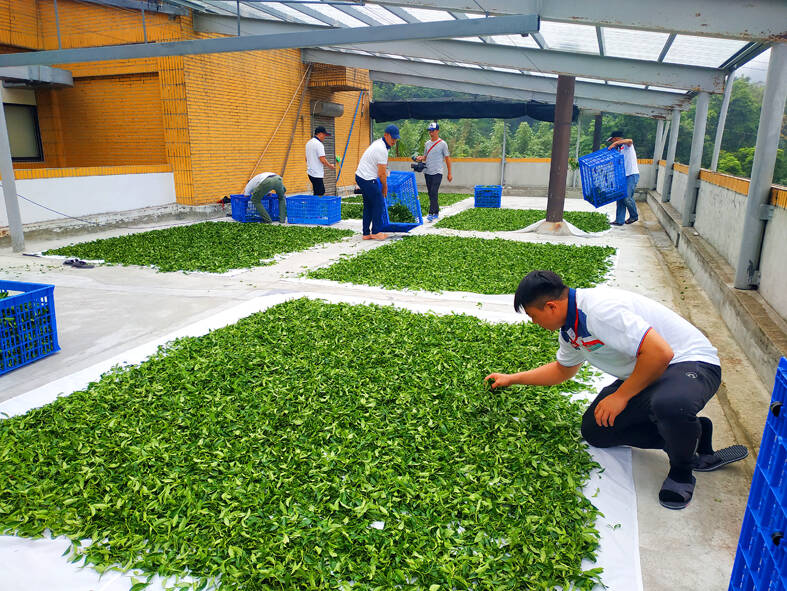Tea production is falling due to the effects of climate change, with this year’s harvest set to be even lower because of typhoon damage, the Ministry of Agriculture’s Tea and Beverage Research Station said yesterday.
Taiwan’s coffee and tea are internationally renowned for their quality, but climate change has caused a dip in overall production, station director-general Su Tsung-chen (蘇宗振) said ahead of the Taiwan International Tea, Coffee, Wine and Food Industry Show in Taipei this weekend.
Taiwanese tea exports exceeded 15,000 tonnes in 2000, but exports over the past three years were about 11,000 to 13,000 tonnes, he said.

Photo courtesy of the Tea and Beverage Research Station
Typhoon Krathon and other storms have also damaged a portion of the winter tea crop, resulting in slightly decreased quality, Su said.
However, Taiwan’s processing techniques have resulted in only minimal decreases in quality, he added.
The station, alongside the ministry’s Agricultural Research and Extension Station, has been introducing heat-resistant tea trees in recent years, Su said, adding that 100 hectares have been planted nationwide.
Agriculture and Food Agency Secretary-General Chen Chi-jung (陳啟榮) said the nation’s total area of tea trees stood at about 12,000 hectares, with an industry value of NT$30 billion (US$925 million).
However, as more people have been drinking coffee in recent years, the total area planted with coffee trees has doubled from 600 to 1,200 hectares, Chen said.
Taiwan-grown and roasted coffee beans have won several notable international competitions, Chen said.
Under the leadership of groups such as the Coffee Industrial Alliance of Taiwan, bean prices have increased and become more sought after, and are now being sold in 15 countries, he added.
The agency has been promoting the use of agricultural produce to make alcohol and wine since 1999, Chen said, adding that the annual value of the wine and alcohol industry is NT$120 million with more than 130,000 liters produced annually.
Asked if Typhoon Krathon would affect the industry, Chen said the agency estimated there would be minimal impacts as production methods could be tweaked to compensate for production to satisfy the market.

Weather conditions across Taiwan are expected to remain stable today, but cloudy to rainy skies are expected from tomorrow onward due to increasing moisture in the atmosphere, according to the Central Weather Administration (CWA). Daytime highs today are expected to hit 25-27°C in western Taiwan and 22-24°C in the eastern counties of Yilan, Hualien, and Taitung, data on the CWA website indicated. After sunset, temperatures could drop to 16-17°C in most parts of Taiwan. For tomorrow, precipitation is likely in northern Taiwan as a cloud system moves in from China. Daytime temperatures are expected to hover around 25°C, the CWA said. Starting Monday, areas

A Taiwanese software developer has created a generative artificial intelligence (AI) model to help people use AI without exposing sensitive data, project head Huang Chung-hsiao (黃崇校) said yesterday. Huang, a 55-year-old coder leading a US-based team, said that concerns over data privacy and security in popular generative AIs such as ChatGPT and DeepSeek motivated him to develop a personal AI assistant named “Mei.” One of the biggest security flaws with cloud-based algorithms is that users are required to hand over personal information to access the service, giving developers the opportunity to mine user data, he said. For this reason, many government agencies and

The National Fire Agency on Thursday said a series of drills simulating a magnitude 8.5 earthquake would be held in September to enhance the government’s emergency response capabilities. Since earthquakes cannot be predicted, only by continuously promoting disaster prevention measures could Taiwan enhance its resilience to earthquakes, agency Director-General Hsiao Huan-chang (蕭煥章) said in a news release. The exercises would be held to mark annual National Disaster Prevention Day on Sept. 21, the aim of which is to test Taiwan’s preparedness and improve its earthquake resilience in case of a major temblor, Hsiao said. As part of those drills, an earthquake alert would

DEFENSE: The National Security Bureau promised to expand communication and intelligence cooperation with global partners and enhance its strategic analytical skills China has not only increased military exercises and “gray zone” tactics against Taiwan this year, but also continues to recruit military personnel for espionage, the National Security Bureau (NSB) said yesterday in a report to the Legislative Yuan. The bureau submitted the report ahead of NSB Director-General Tsai Ming-yen’s (蔡明彥) appearance before the Foreign and National Defense Committee today. Last year, the Chinese People’s Liberation Army (PLA) conducted “Joint Sword-2024A and B” military exercises targeting Taiwan and carried out 40 combat readiness patrols, the bureau said. In addition, Chinese military aircraft entered Taiwan’s airspace 3,070 times last year, up about